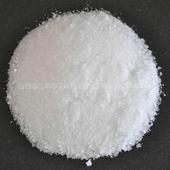丙氨酸是人体可以从其他氨基酸中产生的一种非必需氨基酸,而无需从食物中获取。它通常在大多数人的血液中含量很高,并且是蛋白质食品中浓缩的氨基酸之一。
Alanine is a nonessential amino acid that the human body can produce from other amino acids, and it does not need to be obtained from food. It is usually high in most people's blood and is one of the amino acids concentrated in protein foods.
在所有氨基酸中,它是广泛用于蛋白质构建的氨基酸之一。它被认为是一种糖原氨基酸,由丙酮酸和支链氨基酸(BCAA)合成而成,包括缬氨酸,亮氨酸和异亮氨酸。
Among all amino acids, it is one of the amino acids widely used in protein construction. It is considered to be a glycogen amino acid synthesized from pyruvic acid and branched chain amino acids (BCAA), including valine, leucine and isoleucine.

丙氨酸对身体有什么作用?丙氨酸功能是什么?一些重要的功能包括:
What effect does alanine have on the body? What is the function of alanine? Some important functions include:
在将糖(葡萄糖)转化为能量方面发挥作用-它参与了组织和肝脏之间发生的葡萄糖丙氨酸循环;加工B族维生素;分解色氨酸和维生素B6;帮助酸代谢。
It plays a role in converting sugar (glucose) into energy - it is involved in the glucose alanine cycle that occurs between tissues and the liver; processes B vitamins; breaks down tryptophan and vitamin B6; and helps with acid metabolism.
增强免疫力;促进色氨酸的代谢;形成肌肽,鹅肌肽和泛酸(维生素B5);为大脑和神经系统提供能量。
Enhance immunity; promote tryptophan metabolism; form carnosine, goose carnosine and pantothenic acid (vitamin B5); provide energy for brain and central nervous system.
帮助建立和修复肌肉组织;帮助肝脏;保护细胞免受氧化损伤;帮助维持正常胆固醇水平。
It helps build and repair muscle tissue, helps liver detoxification, protects cells from oxidative damage, and helps maintain normal cholesterol levels.




